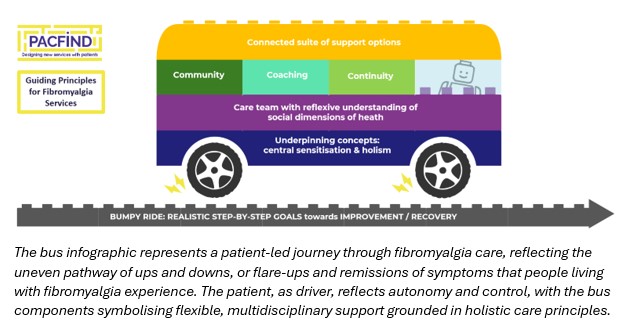Session Information
Date: Monday, October 27, 2025
Title: (1221–1247) Pain in Rheumatic Disease Including Fibromyalgia Poster
Session Type: Poster Session B
Session Time: 10:30AM-12:30PM
Background/Purpose: Fibromyalgia is a contested and poorly supported condition, characterised by widespread pain, fatigue, and cognitive symptoms, often compounded by stigma and delayed diagnosis. Existing services are fragmented and inconsistent, with high patient and system burden. The PACFiND study (PAtient-centred Care for Fibromyalgia: New pathway Design) aimed to inform new models of care for fibromyalgia.
Methods: A mixed method design integrated systematic literature reviews, surveys of, and interviews with, people with fibromyalgia symptoms/diagnosis and healthcare professionals, analysis of routine healthcare data and service case studies, to explore care pathways for fibromyalgia in the UK. Data collection included over 2,700 survey responses from patients and professionals, 31 in-depth interviews, 12 UK-wide service case studies, and national healthcare data on nearly 100,000 individuals. Findings were synthesised through investigator meetings and structured workshops, involving patients, public representatives, clinicians, commissioners, and policymakers to co-design principles of care to inform new care models.
Results: Findings highlighted delayed and inconsistent approaches to diagnosis, especially in men, and limited post-diagnosis support. Many health professionals questioned the validity of a fibromyalgia diagnosis. Patients often faced a revolving door of referrals across specialties, particularly pain management, gastroenterology, and general surgery, and invasive investigations. They reported substantial out-of-pocket costs, difficulty navigating services, and poor work outcomes. Healthcare professionals expressed uncertainty in making a diagnosis and management, with variable understanding of fibromyalgia as a central sensitisation condition. While medication remains a default, patients voiced strong preferences for personalised, holistic, and non-pharmacological interventions, delivered with empathy and continuity. Community resources, such as support groups, play a key role but lack formal recognition. Insights informed evidence based care principles (Figure 1) and potential delivery across different settings. For example: (1) primary care e.g., family physicians for early recognition, supported by training; (2) specialist input for complex diagnosis and management; and (3) wraparound support, integrating physical, psychological, and peer-led services. These aim to reduce inappropriate referrals, improve experience and outcomes, and enable tailored, appropriate place-based care.
Conclusion: The PACFiND study has co-designed multilevel principles for fibromyalgia care aligned with patient needs and system priorities. While conducted in the UK, the challenges identified—delayed diagnosis, fragmented care, and unmet patient needs—are common across healthcare systems globally, including the US. Although the logistics of implementation may differ, the core principles of integrated, person-centred, and evidence-informed care are widely applicable. This model offers a flexible framework to guide service redesign internationally. Next steps include testing in implementation settings and using economic data to support scale-up.
 Figure 1. Evidence-based principles of care to guide fibromyalgia service redesign.
Figure 1. Evidence-based principles of care to guide fibromyalgia service redesign.
To cite this abstract in AMA style:
Hollick R, Beasley M, Choy E, Cupit C, Dulake D, Finlay T, Locock L, McNamee P, Pope C, Wainwright E, Williams D, Macfarlane G. PACFiND: Co-Designing Principles To Inform Reconfiguration Of Fibromyalgia Care Across Health Systems [abstract]. Arthritis Rheumatol. 2025; 77 (suppl 9). https://acrabstracts.org/abstract/pacfind-co-designing-principles-to-inform-reconfiguration-of-fibromyalgia-care-across-health-systems/. Accessed .« Back to ACR Convergence 2025
ACR Meeting Abstracts - https://acrabstracts.org/abstract/pacfind-co-designing-principles-to-inform-reconfiguration-of-fibromyalgia-care-across-health-systems/
